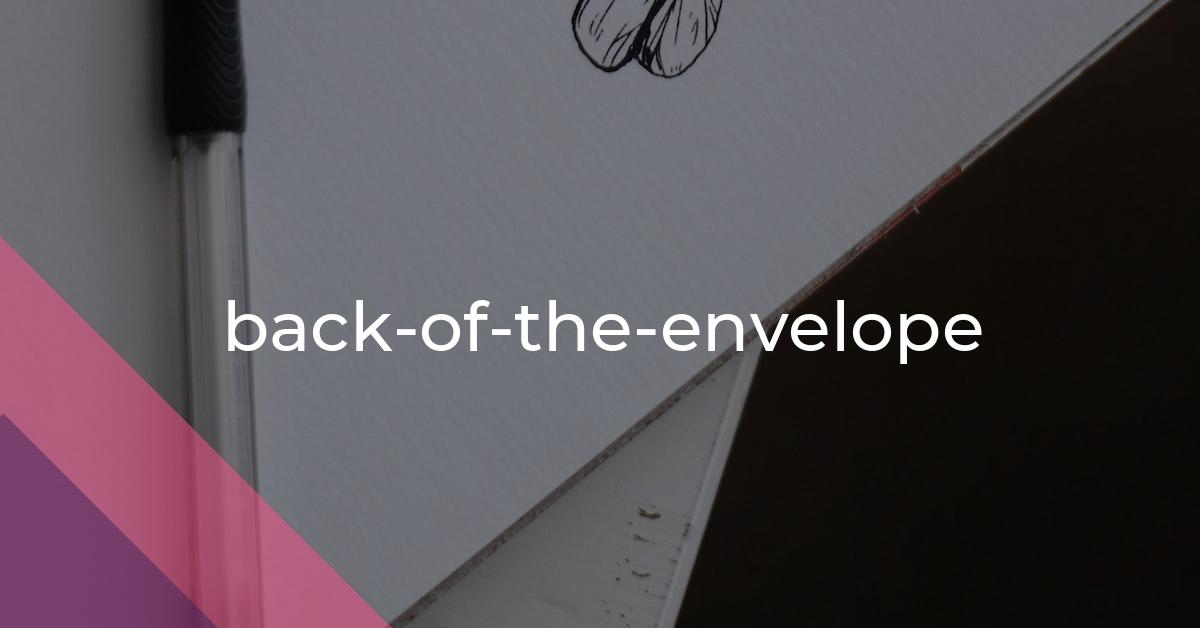back-of-the-envelope: Idiom Meaning and Origin
What does ‘back-of-the-envelope’ mean?
The idiom "back-of-the-envelope" refers to a rough estimation or calculation made quickly and informally, often using easily accessible information. It conveys the idea of a simple, preliminary analysis performed without much detailed planning or precision.

Idiom Explorer
The idiom "last minute" refers to the final moments before a deadline or event. It suggests that something is done or happens with very little time or notice remaining, often causing rushed or stressful situations.
The idiom "I'd say" is used to express an opinion or estimate based on one's judgment or perception, often without definitive or factual evidence. It signifies a personal assessment or guess about a situation or statement.
The idiom "hazard a guess" means to make a guess or estimation without having all the necessary information. It implies taking a risk or chance in offering an opinion or answer.
The idiom "hand over head" refers to doing something quickly or without care, often in a hurried or reckless manner.
The idiom "half-baked" means something that is poorly planned, thought out or executed, resulting in an incomplete or unfinished outcome.
The idiom "gut check" is a metaphorical expression that is often used to describe a situation where someone assesses their own feelings or reactions by relying on their instinct or intuition, particularly in times of challenge or adversity.
The idiom *fudge factor* refers to an adjustment made to a calculation or a set of data in order to account for errors, uncertainties, or personal bias. It implies that the adjustment may not be completely accurate or reliable.
The idiom "fly by the seat of one's pants" means to act or make decisions without a plan or knowledge, relying on intuition or improvisation. It originates from aviation, where pilots had to rely on their senses rather than instruments.
Mysterious Envelope Mathematics
The idiom "back-of-the-envelope" is a widely used expression in the English language. Here are the key facts about this idiom:
The literal meaning of the term refers to making quick calculations or estimations on the back of an envelope.
It is believed that the idiom originated from engineers, scientists, or businessmen who would often use the nearest piece of paper, such as an envelope, to perform calculations or jot down important information.
The term gained popularity in the mid-20th century and became associated with the practice of performing rough calculations or estimations, often without the need for extensive formal analysis.
The idiom is commonly used in various contexts, including but not limited to business, technology, and science, to refer to a quick and simplified method of problem-solving or decision-making.
By its nature, the idiom suggests a certain level of informality and immediacy in the decision-making process, as opposed to more rigorous and detailed approaches.
Given these facts, let's delve into a detailed analysis of the idiom "back-of-the-envelope" and its significance in American English.
The idiom "back-of-the-envelope" encapsulates the notion of impromptu calculations or problem-solving exercises performed on the back of an envelope, hence its name. This idiom is widely understood and used by English speakers in the United States, especially in professional contexts such as business, engineering, and sciences.
This particular idiom carries a sense of pragmatism and practicality. It implies the ability to quickly and efficiently produce ballpark estimates or rough approximations, without the need for complex analysis or extensive data. "Back-of-the-envelope" calculations are often employed at the early stages of decision-making processes, serving as a first step towards further investigation or more thorough calculations.
The idiom "back of one's hand" is closely related to "back-of-the-envelope." It implies a deep knowledge or familiarity with a particular subject, as if one knows the back of their hand. Just as someone who frequently uses the back of an envelope for calculations becomes intimately acquainted with it, a person who knows something like the back of their hand has a comprehensive understanding of it.
When someone employs the "back-of-the-envelope" approach, they are embracing a certain level of informality in their problem-solving or decision-making process. The idiom highlights the trade-off between time and accuracy. While the calculations performed on the back of an envelope may not be precise or comprehensive, they provide a rapid assessment or an initial idea that can guide further actions or discussions.
The idiom "back-pocket" is also related to "back-of-the-envelope." It refers to having something readily available or easily accessible, just like an envelope in one's back pocket. When someone uses the "back-of-the-envelope" method, they are utilizing a quick and convenient tool for making estimations or calculations without the need for extensive preparation or resources, much like having something in their back pocket ready to use.
In the United States, this idiom is particularly prevalent in fields that require quick thinking and on-the-spot problem-solving, such as business negotiations, project management, and scientific research. It is often used as a rhetorical device to emphasize an efficient and practical approach while acknowledging the limitations of the initial estimation.
The idiom "cut corners" is another related idiom that ties in with "back-of-the-envelope." It means to take shortcuts or bypass certain steps in order to save time or effort. When someone uses the "back-of-the-envelope" method, they may be cutting corners by simplifying or streamlining the problem-solving process to reach a quick estimate or approximation. While this approach may not always yield the most accurate results, it can be a practical and time-saving strategy in certain situations.
Despite its origin and initial associations with technical or scientific endeavors, the idiom "back-of-the-envelope" has permeated the general lexicon and is now employed in everyday conversation. Whether discussing financial projections, political strategies, or even planning a social gathering, people may use the idiom to convey the idea of making rough calculations or estimations without the need for detailed analysis.
The idiom "behind someone's back" is an additional related idiom when considering "back-of-the-envelope." It denotes doing something without the knowledge or awareness of someone else. When someone uses the "back-of-the-envelope" approach, they may be making estimations or decisions without involving others or seeking their input. This idiom highlights the independent and autonomous nature of the "back-of-the-envelope" method, allowing individuals to work quickly and efficiently on their own.
The idiom "back-of-the-envelope" carries a distinctive meaning in American English. It represents a pragmatic and time-sensitive approach to problem-solving and decision-making, emphasizing rapid estimations and the acceptance of potential inaccuracies or oversimplifications. While the idiom may have originated in specific professional fields, it has found its way into broader usage and serves as a testament to the importance of efficiency and practicality in various aspects of American life.
Example usage
Examples of how the idiom "back-of-the-envelope" can be used in a sentence:
- I quickly did a back-of-the-envelope calculation to estimate the total cost of the project.
- The back-of-the-envelope figures suggested that our profits would be significantly higher this quarter.
- We made a back-of-the-envelope assessment of the situation before deciding on the best course of action.
More "Calculations" idioms
We missed the mark - nothing found.



